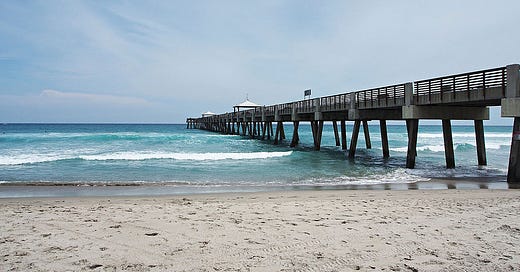The Retreat of the Successful
Why Local Businesses Are Disappearing—and So Are the People Who Once Built Them
This is a guest post by Justin Powell.
A few weeks ago, I spent two days with a business owner who was preparing to sell his company. The sale would be life-changing. He’d spent decades building the business, and now it was time to cash out. He already had a house picked out in Florida, planning to spend six months a year there.
I asked him about his kids and grandkids. They lived nearby. His 90-year-old mother? He was her primary caregiver. He served on several local nonprofit boards and civic committees. When I asked what would happen to all that, he hesitated.
“A lot of people aren’t happy about the Florida house,” he admitted. “Especially my mom.”
That line stuck with me. Not because it was rare—but because I’ve heard versions of it again and again. The Florida house has become a symbol. It’s not just about retirement. It’s about retreat. About people who once carried the weight of a place deciding they’ve had enough—and disappearing just when they’re needed most.
I’ve come to believe this quiet exodus is hollowing out American towns—not just economically, but relationally, institutionally, even spiritually. Because the people leaving aren’t just anybody. They’re the backbone. The business owners, the civic leaders, the grandparents, the volunteers. And once they’re gone, they’re gone.
The Disappearance of Local Business
The deeper problem isn’t just where they’re going—it’s that they’re going.
This shift is happening alongside another troubling trend: the slow disappearance of locally owned businesses. Everywhere I go, I notice the same thing: there are fewer local businesses, and fewer people who stick around to run them.
It used to be you could choose between five gravel suppliers or ten HVAC companies. Now you’re lucky if you have two—and they’re probably owned by the same Private Equity-owned holding company.
Across nearly every industry, consolidation is eating the world. Sand and gravel, electrical contracting, printing, landscaping—you name it. Companies that used to be run by local owners with their names on the trucks are now just another branch of a firm four states away. The service suffers. The prices go up. And personal accountability vanishes.
But the real loss isn’t customer service. It’s ownership. It’s opportunity.
When there were ten local HVAC companies, there were ten owners. Ten chances for someone young in the business to one day buy out the old guy. Now there’s one. And it’s not selling.
We’re not just losing businesses. We’re losing the ladder. And with it, we’re losing the kind of people who felt responsible for their place—because they owned a piece of it.
Selling Out vs. Checking Out
Selling a business isn’t the problem. People age. Seasons change. Transitions are necessary. But what concerns me is that so many of these transitions now end in disengagement. Too often, the business is sold to a faceless buyer, and the owner disappears—to a beach, to a golf course, to a different life altogether.
I’ve bought several businesses myself. I’m not against selling. But what I’ve come to see is that when it’s not handled with care, a sale doesn’t just change the company—it disrupts the entire ecosystem around it.
Employees lose their leader. The community loses a sponsor. Churches, nonprofits, and civic boards lose someone who said “yes” without needing recognition. The next generation loses a mentor. And families—especially extended families—lose a rooted presence they didn’t even realize they relied on.
The Power of Predictability
Growing up, my parents would often drop me off at my grandparents’ house for a few hours in the evening. There was no plan. No phone call. They just knew my grandparents would be there—and happy to have me.
We’d play dominoes. Watch Jeopardy. Cook dinner. Nothing impressive. But their predictability gave my parents room to breathe. Their “boringness” was actually the backbone of our family life.
That kind of reliability only comes from people who are planted. People who don’t leave. People who carry the quiet weight of community—by showing up, again and again, for decades.
It’s easy to overlook the value of these people until they’re gone. And when they go—especially all at once—it’s nearly impossible to replace them.
Not About Florida
To be clear, I’m not blaming Florida. Rest is good. Warm weather is great. And after decades of building something, enjoying the fruits of your labor isn’t wrong.
But the problem isn’t geography. It’s disconnection. It’s a mindset that says: I’m done. Let someone else carry the weight. It’s the decision to pull up roots instead of planting deeper.
What we’re losing isn’t productivity—it’s presence. You can’t replace 40 years of trust and community by joining a golf club or attending a donor breakfast in a new city. That kind of connection only comes from time, proximity, and constancy.
What’s Left Behind
The people who remain—young families, workers, small nonprofits—are left holding the pieces. They’re doing their best, but the center doesn’t hold like it used to.
The PTA struggles to raise money. The church board is short-staffed. The next wave of local leaders lack support and mentors. And all the while, the people who once made it all go are sending postcards from their condo in Sarasota.
Even the retirees themselves don’t gain as much as they think. Their calendars may be full, but they often feel rootless. Disconnected. You can’t recreate the depth of a 30-year friendship at age 70 wandering around your empty vacation home. And when those familiar faces are no longer around, a kind of spiritual loneliness sets in.
The Way Back
I’m not calling for people to die at their desks. But I am calling for them to finish well—to stay invested in the places that shaped them, to hand off what they’ve built with care, and to think generationally, not transactionally. That means mentoring the next owner, selling locally when possible, and remaining present—even if you’re no longer in charge.
What our towns need isn’t another plaque on a donor wall. They need people with the quiet resolve to stay. To build instead of retreat. To be the ones others count on—not just for money, but for memory, continuity, and care.
Because when everyone leaves, there’s nothing left to return to.
Cover image credit: Derek Ramsay, CC BY-SA 4.0






FWIW -- a contact recently moved from Wall St. to down here in the South to launch a venture as a business broker / lower-mid market M&A investment banker, helping Boomers do exactly this: sell their small-to-mid-sized local businesses and retire.
He told me that initially he thought there would be some cultural resistance from the prospective sellers to what he's doing. Some skepticism that he would do right by the employees, customers, other stakeholders in the company. He was all geared up to convince these prospective sellers that everyone would be taken care of.
But so far, he tells me he has encountered virtually no questions of this sort. All anyone he talks to wants is the largest possible price tag before cashing out and moving on. Of course, the other part of this is the kids generally have no interest in taking over the family business, either.
This is ironically reminiscent of Atlas Shrugged.